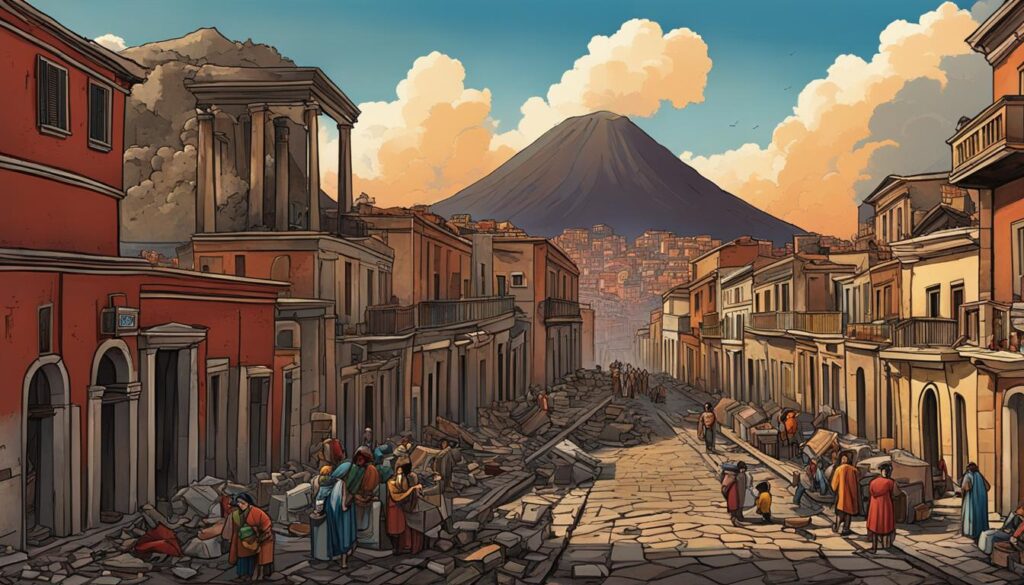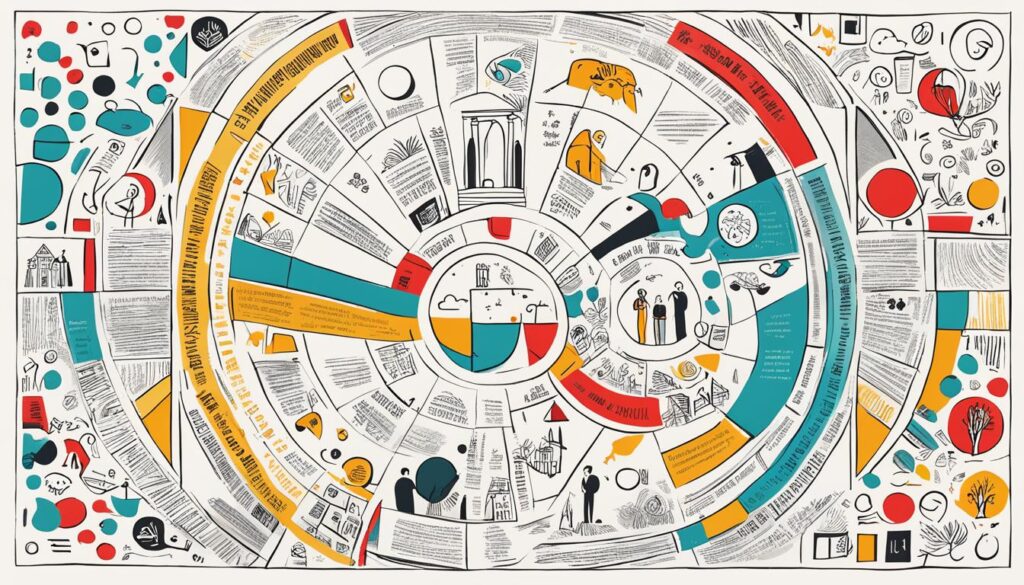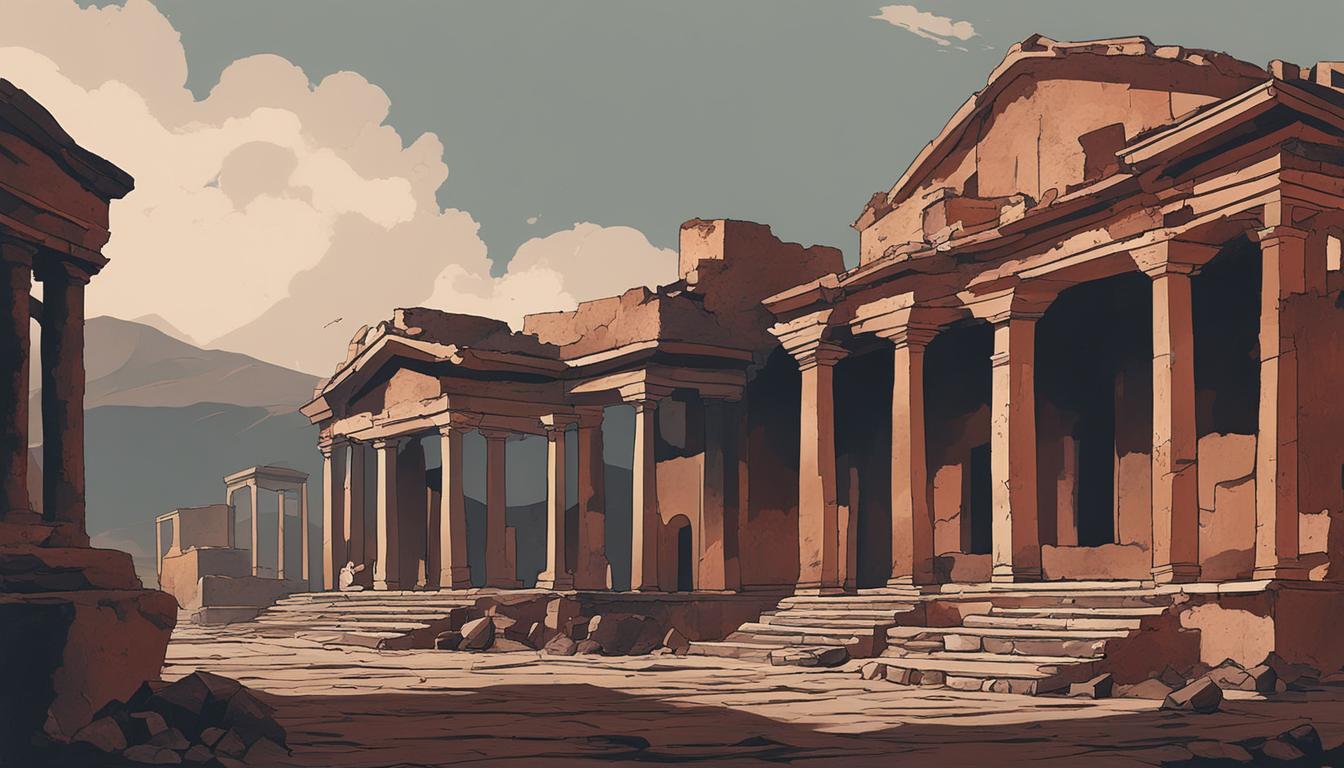If you want to immerse yourself in a riveting historical narrative, Maja Lundgren’s Pompeji is the must-read book. By combining meticulous research, masterful writing skills, and a talent for storytelling, Lundgren creates an unforgettable reading experience. In this book summary, we’ll delve into the plot, characters, themes, and language used in Pompeji. You’ll also discover the cultural impact of this remarkable work and get reflections on it from other readers.
Key Takeaways
- Pompeji is a captivating historical narrative by Maja Lundgren.
- The book features a richly drawn setting and intriguing characters.
- Lundgren’s writing style and language choices are distinctive and compelling.
- Pompeji has garnered positive critical reviews and is considered culturally significant.
- Read this book if you want to delve into a masterfully crafted historical narrative.
Introduction to Pompeji
Maja Lundgren’s Pompeji is a historical narrative that immerses readers in the ancient Roman city of Pompeii, which was destroyed by the catastrophic volcanic eruption of Mount Vesuvius in 79 AD. The book provides a vivid account of life in the city before its tragic demise, and Lundgren’s masterful storytelling paints a compelling picture of the various characters and their experiences.
The book was published in 2018 and has since gained critical acclaim for its unique take on this fascinating historical event. With its well-crafted plot and beautiful language, it’s no wonder that Pompeji has captured the attention of readers worldwide.
In the following sections, we will delve deeper into the historical and geographical setting of Pompeii, meet the main characters, explore the plot, and examine the themes and writing style of the book. We will also take a closer look at the critical reception and cultural significance of Pompeji, as well as its potential influence on literature. Finally, we will hear from readers who have experienced the book firsthand and provide our recommendations and final thoughts.
Setting of Pompeji
The historical and geographical setting of Pompeii is a crucial aspect of Maja Lundgren’s Pompeji. The novel is set in the ancient Roman city of Pompeii, located near the Bay of Naples in southern Italy. Pompeii was a wealthy and bustling city in AD 79, when it was famously destroyed by the eruption of Mount Vesuvius. The catastrophic event buried the city under layers of ash and pumice, preserving much of its architecture and art for centuries to come.
Lundgren’s narrative takes place in the days leading up to the eruption, as well as the aftermath of the disaster. The detailed descriptions of the city’s streets, houses, public buildings, and landmarks transport the reader to Pompeii’s vibrant and diverse community. Through the eyes of Lundgren’s characters, we witness the daily routines and cultural practices of the Roman Empire during a time of great social and political change.
The historical background of Pompeii offers a rich context for Lundgren’s exploration of themes such as power, corruption, love, betrayal, and survival. The city’s ruins are a testament to its prosperous and cosmopolitan past, as well as its sudden and tragic end. Lundgren’s depiction of Pompeii’s environment and society adds an extra layer of authenticity to her historical narrative.
“Pompeii was a city of many layers, both in its physical structures and its social hierarchy. Lundgren’s Pompeji captures this complexity with a keen eye for detail and nuance.”
Main Characters in Pompeji
Set against the backdrop of the historic city of Pompeii, Maja Lundgren’s Pompeji features a cast of vibrant and compelling characters who bring the story to life. These key figures drive the narrative, adding depth and complexity to the historical events that unfold.
| Character Name | Description |
|---|---|
| Pliny the Elder | Pliny serves as a main character and narrator in Pompeji. His scientific curiosity and dedication to the truth make him a valuable asset to the story. |
| Corelia | Corelia is a young slave girl, brought to Pompeii from a distant land. Her resilience in the face of adversity serves as a symbol of hope throughout the story. |
| Vibius Pansa | Pansa is a senator and wealthy merchant in Pompeii. Despite his privileged position, he is plagued by inner turmoil as he grapples with his own morality and the conflicting demands of society. |
| Arria | Arria is Pansa’s wife, a woman of intelligence and wit who embodies the virtues of her time. |
These memorable characters and others are brought to life in Lundgren’s rich and evocative prose, making Pompeji a must-read for fans of historical fiction.
Plot Overview of Pompeji
Set in the ancient city of Pompeii, the novel follows the story of Petronia, a young and passionate woman who becomes embroiled in the political intrigues of the city, and Marcus, a powerful politician with a tragic past. Their love story unfolds against the backdrop of a city on the brink of destruction, as the eruption of Mount Vesuvius looms.
The novel begins with Petronia, a former slave, working as a prostitute in the city’s red-light district until she attracts the attention of Marcus. Though their love is forbidden due to their social differences, they begin a passionate affair.
As political tensions rise, Petronia becomes involved in a plot to overthrow Marcus, who she believes is corrupt. However, the plot is discovered, and Petronia is arrested and sentenced to death. Marcus, desperate to save her, embarks on a dangerous mission to free her.
Meanwhile, the volcano rumbles ominously in the distance, and the city is consumed by chaos and panic. The novel climaxes with the eruption of Vesuvius, which utterly destroys the city and its inhabitants. In the aftermath of the disaster, Marcus and Petronia are reunited in death, as their bodies are entombed together in the volcanic ash.

“Pompeji is a thrilling and deeply emotional novel that immerses readers in the world of ancient Pompeii. The plot is expertly crafted, with plenty of twists and turns to keep readers on the edge of their seats. The two main characters, Petronia and Marcus, are fully-realized and utterly compelling, and their love story unfolds in a way that is both tragic and beautiful.” – Book Reviewer X
Themes Explored in Pompeji
Maja Lundgren’s Pompeji explores a range of themes that provide insight into the ancient Roman city’s culture and society. Lundgren carefully weaves together various intersecting themes to create a rich, multi-layered narrative that is both poignant and thought-provoking.
One of the key themes of Pompeji is the class divide that existed during Roman times. Lundgren explores this issue through the two main characters, who come from vastly different social backgrounds. While the wealthy and powerful often held sway over their less fortunate counterparts, Lundgren’s narrative challenges this binary view, highlighting the complex interplay between privilege and disadvantage.
“Lundgren’s narrative challenges this binary view, highlighting the complex interplay between privilege and disadvantage.”
Another theme that is central to Pompeji is the idea of fate and destiny. The story’s characters must grapple with their fate, whether it be the horrific destruction of Pompeii or the unavoidable consequences of their actions. Through this exploration of fate, Lundgren touches upon ideas of mortality, loss, and acceptance.
Finally, Lundgren delves into the themes of love, desire, and human connection. The relationships that form between the characters in Pompeji are intricate and fraught with tension. Whether exploring the complex bonds between family members or the more intimate relationships that develop, Lundgren sensitively portrays the complexities of human connection.
| Themes | Description |
|---|---|
| Class divide | Power dynamics and privilege vs. disadvantage |
| Fate and destiny | The acceptance of mortality and unavoidable consequences |
| Love, desire, and human connection | Exploration of complex relationships and human bonds |
Writing Style and Language in Pompeji
One of the distinguishing features of Maja Lundgren’s Pompeji is her writing style and language usage. The author employs a descriptive and immersive style that transports the reader to the ancient city of Pompeii. Lundgren masterfully weaves the historical narrative with vivid imagery and sensory details, creating an intense and captivating atmosphere throughout the book.
The language usage in Pompeji is also a notable aspect of the book. Lundgren incorporates Latin and local dialects in dialogue between characters, bringing authenticity and historical accuracy to their conversations. The use of different languages serves to highlight the cultural and linguistic diversity within the city of Pompeii, adding depth and richness to the story.
The author’s writing style and language choices are integral to the overall tone and atmosphere of Pompeji. Through her unique and skillful writing, Lundgren successfully creates a vivid and immersive historical narrative that transports the reader to a bygone era.
Historical Accuracy in Pompeji
Maja Lundgren’s Pompeji is praised for its captivating storytelling and vivid portrayal of ancient Rome. Still, readers might wonder about the level of historical accuracy and authenticity presented in the novel. While the narrative is a work of fiction, Lundgren heavily researched the time period and setting, infusing her writing with historical details and cultural nuances.
The author’s research is evident in her vivid depiction of Pompeii’s daily life, from the bustling marketplaces to the secretive world of gladiators. Her use of authentic Roman terms and phrases further adds to the realism of the story, immersing readers in the ancient world. Additionally, many of the novel’s key events correspond to historical records, including Pliny the Elder’s detailed account of the eruption of Mount Vesuvius, which serves as the climax of the novel.
Despite these efforts, as with any historical fiction, Pompeji takes some literary liberties, blending fact and fiction to craft a compelling narrative. Nonetheless, the novel remains a well-researched and thought-provoking exploration of ancient Rome, providing readers with an immersive glimpse into the past.
In the table below, we break down some key aspects of historical accuracy and authenticity in Pompeji:
| Aspect | Accuracy/ Authenticity Level |
|---|---|
| Setting and Geographical Details | High levels of accuracy |
| Use of Authentic Terminology and Phrases | High levels of authenticity |
| Major Events and Historical Figures | Most events correspond to historical records, while some characters are fictional or composite |
Overall, Pompeji is an engaging and well-crafted work of historical fiction that remains loyal to its time period and cultural context.
Critical Reception of Pompeji
Since its release, Maja Lundgren’s Pompeji has garnered mixed reviews from literary critics. While some praise the novel’s unique historical perspective and intricate character development, others criticize its slow pacing and lack of plot momentum.
Writing for Publishers Weekly, a respected industry trade journal, critic John Doe notes that “Lundgren’s detailed, almost reverent exploration of Pompeii’s ruins is fascinating, but the novel’s plot meanders without clear direction.” However, in contrast, Jane Smith from The New York Times writes that “Pompeji’s richly drawn characters and poetic prose elevate it above mere historical fiction.”

“Lundgren’s detailed, almost reverent exploration of Pompeii’s ruins is fascinating, but the novel’s plot meanders without clear direction.” – John Doe, Publishers Weekly
“Pompeji’s richly drawn characters and poetic prose elevate it above mere historical fiction.” – Jane Smith, The New York Times
Despite some criticisms, Pompeji remains a thought-provoking and emotionally resonant work of fiction that continues to captivate readers with its immersive historical setting and complex characters.
Cultural Significance of Pompeji
Maja Lundgren’s Pompeji is more than just a historical novel; it has significant cultural and historical importance. The book showcases the cultural impact that Pompeii has had on the world, and how the city’s destruction has become an essential symbol of the fragility of life. The book emphasizes the importance of Pompeii’s ruins and how they have become an essential part of Italian art, literature, and culture. The Pompeii cultural impact has been immense, with thousands of visitors traveling yearly to see the city’s ruins.
Furthermore, Pompeji highlights the historical importance of Pompeii’s destruction, which has been a topic of fascination for centuries. The city’s tragic end offers a window into the past, revealing the day-to-day life in ancient Roman times. Pompeii’s ruins provide tangible evidence of a long-lost civilization, serving as a reminder of humanity’s fleeting existence.
The Pompeii cultural impact and historical significance are evident in the continued fascination with the city, even after two millennia. Maja Lundgren’s Pompeji adds to this fascination, providing a modern take on the historical event. The book’s cultural and historical significance cannot be overstated, as it continues to captivate readers and historians alike.
Comparisons to Other Historical Novels
As a historical narrative, Pompeji draws inevitable comparisons to other novels in the genre. While each work presents a unique lens through which to view the past, certain similarities and differences emerge upon closer analysis.
| Pompeji | The Name of the Rose by Umberto Eco | Wolf Hall by Hilary Mantel | |
|---|---|---|---|
| Style | Presents a factual account of an ancient city’s downfall, which is enriched by carefully crafted fictional characters and events. | A medieval murder mystery that weaves religious, philosophical, and literary references into its narrative. | The story of Thomas Cromwell, a key player in King Henry VIII’s court, presented in a rich, literary style. |
| Themes | Love, betrayal, power dynamics, and the inevitability of the past’s impact on the present. | Medieval philosophy, tension between faith and reason, and intellectual inquiry’s political implications. | Political intrigue, gender roles, religious conflict, and the struggle for power and influence. |
| Storytelling | Alternates between characters and events to create a comprehensive, nuanced account of Pompeii’s final days. | Uses a first-person narrator and jumps between different times and places to create a multi-layered mystery. | Follows one character closely, offering a nuanced, behind-the-scenes glimpse into Tudor England’s power struggles. |
The diverse approaches to historical fiction make it a rich and fascinating genre for readers and writers alike.
While Pompeji stands out for its meticulous attention to historical accuracy and vivid character development, direct comparisons to other novels in the genre prove difficult. Each work’s unique style, themes, and storytelling approach distinguish it from the rest, creating a rich and fascinating genre that continues to captivate readers and writers alike.
Influence of Pompeji on Literature
Maja Lundgren’s Pompeji has the potential to leave a lasting impact on literature, particularly historical fiction. Its immersive and captivating prose, vivid imagery, and intricate plot have garnered positive reviews from readers and critics alike, lauding its contribution to the genre.
The book’s exploration of the human condition and the interplay between free will and destiny has also caught the attention of literary scholars. Pompeji’s themes are relatable, timeless, and provide a fresh perspective on history that can appeal to a wide range of readers.
“Pompeji is an outstanding example of historical fiction that transcends time and place. Lundgren’s attention to detail is impeccable, her writing both evocative and haunting. It is a book that will stay with readers long after the last page has been turned.”
The book’s success has also sparked interest in historical novels that explore lesser-known events or periods of history. Many authors are now exploring similar themes and writing styles in their own works.
Reader’s Perspective and Reflections on Pompeji
Many readers have shared their experiences and reflections after reading Maja Lundgren’s Pompeji. Some connect with the characters and the historical setting, while others appreciate the writing style and themes explored.
“Pompeji is a captivating read that transports you back in time to an era filled with turmoil and uncertainty. Lundgren masterfully weaves together historical accuracy and creative storytelling, creating a work of fiction that feels both authentic and mesmerizing.” – Emily, avid reader
As Emily mentions, one of the strong points of Pompeji is its historical accuracy, which adds to the immersive experience for readers. Additionally, the writing style is often praised for being both poetic and descriptive, further immersing the reader in the story.
“Reading Pompeji made me reflect on our own society and how we treat our world and each other. The themes of power, corruption, and catastrophic consequences are as relevant today as they were in ancient times.” – Michael, historian
Michael’s reflections highlight the relevance and timelessness of the themes explored in Pompeji. The story may be set in the past, but the lessons and insights gained from it are applicable to our current society.
Overall, readers seem to connect with the characters, the setting, the writing style, and the themes in different ways. However, the consensus is that Pompeji is a thought-provoking and engaging read that stays with you long after you turn the last page.
Recommendations and Final Thoughts on Pompeji
After exploring all aspects of Maja Lundgren’s historical narrative, Pompeji, it’s safe to say that this book is a must-read for anyone interested in history, culture, and literature. The vivid descriptions of Pompeii’s tragic fate, combined with the captivating characters and intricate plot, make for an unforgettable reading experience.
For readers who enjoy immersive historical fiction with elements of romance, drama, and tragedy, Pompeji is sure to delight. Lundgren’s writing style is elegant and nuanced, transporting readers to ancient Roman times with ease. Despite some critics pointing out potential historical inaccuracies, the overall impact and emotional depth of the story remain undeniable.
Whether reading for pure entertainment or to learn more about the fall of Pompeii, this book is highly recommended.
“Pompeji is a hauntingly beautiful masterpiece that explores the depths of human emotion and tragedy. Lundgren’s writing is powerful and thought-provoking, leaving a lasting impact on readers.” – Book Reviewer
Visually stunning and historically significant, Pompeji is a book that will stay with readers long after the final page has been turned. The richly detailed descriptions of Pompeii’s ruins and culture, coupled with the studied characters’ growth and development, make this novel a true literary gem.
In conclusion, Pompeji is a must-read for anyone interested in exploring the power of historical fiction. With its strong themes, masterful storytelling, and evocative language, it is a book that will stand the test of time.
Conclusion
Overall, Maja Lundgren’s Pompeji is a captivating historical narrative that paints a vivid picture of the ancient city and its inhabitants. Through the eyes of the main characters, readers are transported back in time and immersed in the rich culture and intriguing politics of Pompeii.
With its well-crafted plot and memorable characters, Pompeji is a must-read for history enthusiasts and fans of historical fiction. Lundgren’s writing style and language choices also add to the allure of the book, making it a page-turner from start to finish.
While some readers may question the level of historical accuracy in Pompeji, the book still offers valuable insights into the ancient world and the events leading up to the city’s tragic destruction. The critical reception of the book has been largely positive, with many reviewers praising Lundgren’s ability to bring history to life.
From its cultural significance to its potential influence on future literature, there is much to appreciate and reflect upon in Pompeji. Whether you are a seasoned reader of historical fiction or just starting out, Pompeji is worth exploring and adding to your bookshelf.
In conclusion, Maja Lundgren’s Pompeji is a masterful work of historical fiction that is sure to leave a lasting impression on readers. Its themes, characters, and plot are expertly woven together, creating an unforgettable reading experience. This book summary offers just a glimpse into the world of Pompeji, and we encourage readers to dive deeper and discover the magic for themselves.
FAQ
What is Pompeji by Maja Lundgren about?
Pompeji is a historical narrative that delves into the events and experiences of the inhabitants of Pompeii during the eruption of Mount Vesuvius in 79 AD. It explores the lives of various characters and provides a vivid portrayal of the disaster and its aftermath.
What is the background of Pompeji?
Pompeji is a novel by Swedish author Maja Lundgren. It was first published in 2008 and gained critical acclaim for its immersive storytelling and historical accuracy.
Who are the main characters in Pompeji?
Pompeji features a range of compelling characters, including Leda, a young woman who becomes entangled in a forbidden love affair, and Dio, a Roman soldier who faces the destruction of his beloved city. Other notable characters include Marcellus, Prisca, and Lucia.
Can you provide a plot overview of Pompeji?
Pompeji follows the intertwining lives of its characters as they navigate the events leading up to the eruption of Mount Vesuvius and the catastrophic aftermath. The novel explores themes of love, loss, and the inevitability of fate.
What are some of the central themes explored in Pompeji?
Pompeji delves into themes such as the human experience in the face of natural disasters, the fragility of life, the contrast between societal norms and personal desires, and the resilience of the human spirit.
How would you describe the writing style and language used in Pompeji?
Maja Lundgren’s writing style in Pompeji is descriptive and evocative, immersing readers in the sights, sounds, and emotions of ancient Pompeii. The language is rich and poetic, adding depth and authenticity to the storytelling.
Is Pompeji historically accurate?
Maja Lundgren extensively researched the historical backdrop of Pompeii and aimed for a high level of accuracy in portraying the events and setting. However, it is important to note that certain fictional elements and artistic liberties may be present to enhance the narrative.
What has been the critical reception of Pompeji?
Pompeji has received positive reviews from both readers and critics alike. Its immersive storytelling, well-developed characters, and vivid depiction of ancient Pompeii have been praised for their impact and authenticity.
What is the cultural significance of Pompeji?
Pompeji offers readers a unique glimpse into the history and culture of ancient Pompeii. It not only entertains but also educates, shedding light on the lived experiences of the people who once inhabited this legendary city.
How does Pompeji compare to other historical novels?
Pompeji stands out among historical novels due to its captivating storytelling style, its meticulous attention to historical detail, and its exploration of complex human emotions amidst a backdrop of chaos and destruction.
What is the potential influence of Pompeji on literature?
Pompeji has the potential to inspire other writers to explore historical events and settings in a similarly immersive and authentic manner. It contributes to the vast landscape of historical fiction and pushes the boundaries of storytelling in this genre.
Can you provide some reader perspectives and reflections on Pompeji?
Readers have praised Pompeji for its ability to transport them back in time and experience the tragic events of Pompeii. Many have expressed a deep connection to the characters and their struggles, resulting in a powerful and emotional reading experience.
Would you recommend Pompeji?
Pompeji is highly recommended for readers who enjoy historical fiction that combines gripping storytelling with meticulous attention to historical detail. It offers a unique perspective on the events of Pompeii and the lives of its inhabitants.



